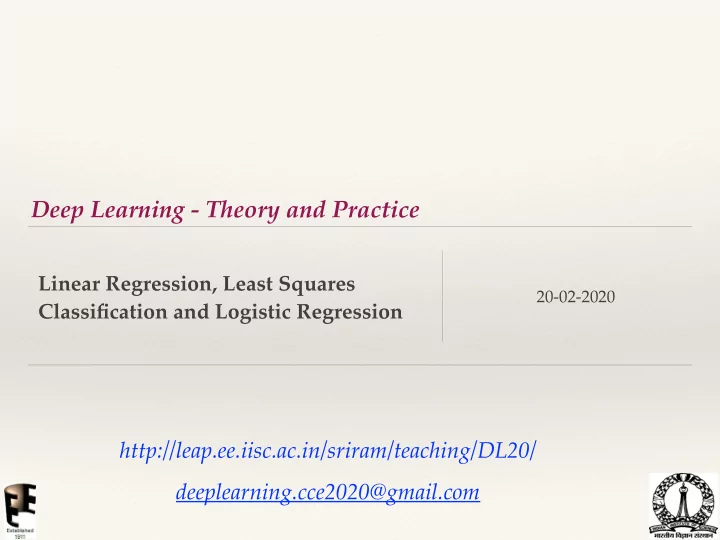

Deep Learning - Theory and Practice Linear Regression, Least Squares 20-02-2020 Classification and Logistic Regression http://leap.ee.iisc.ac.in/sriram/teaching/DL20/ deeplearning.cce2020@gmail.com
Least Squares for Classification ❖ K-class classification problem ❖ With 1-of-K hot encoding, and least squares regression Bishop - PRML book (Chap 3)
Logistic Regression ❖ 2- class logistic regression ❖ Maximum likelihood solution ❖ K-class logistic regression ❖ Maximum likelihood solution Bishop - PRML book (Chap 3)
Typical Error Surfaces Typical Error Surface as a function of parameters (weights and biases)
Learning with Gradient Descent Error surface close to a local
Learning Using Gradient Descent
Parameter Learning • Solving a non-convex optimization. • Iterative solution. • Depends on the initialization. • Convergence to a local optima. • Judicious choice of learning rate
Least Squares versus Logistic Regression Bishop - PRML book (Chap 4)
Least Squares versus Logistic Regression Bishop - PRML book (Chap 4)
Neural Networks
Perceptron Algorithm Perceptron Model [McCulloch, 1943, Rosenblatt, 1957] Targets are binary classes [-1,1] What if the data is not linearly separable
Multi-layer Perceptron Multi-layer Perceptron [Hopfield, 1982] non-linear function ( tanh,sigmoid ) thresholding function
Neural Networks Multi-layer Perceptron [Hopfield, 1982] non-linear function ( tanh,sigmoid ) thresholding function • Useful for classifying non-linear data boundaries - non-linear class separation can be realized given enough data.
Neural Networks Types of Non-linearities tanh sigmoid ReLu Cost-Function Cross Entropy Mean Square Error are the desired outputs
Learning Posterior Probabilities with NNs Choice of target function • Softmax function for classification • Softmax produces positive values that sum to 1 • Allows the interpretation of outputs as posterior probabilities
Recommend
More recommend